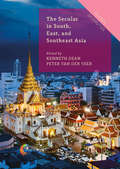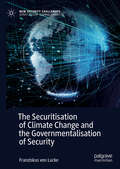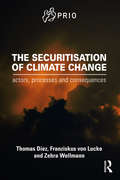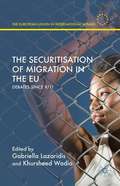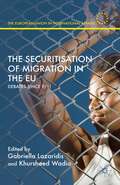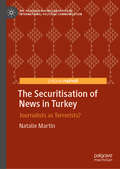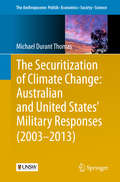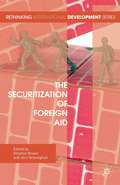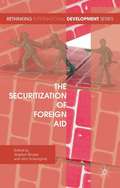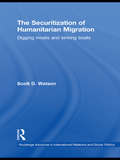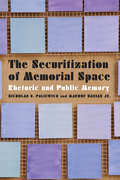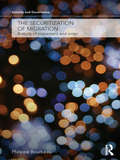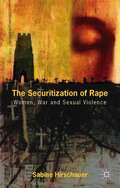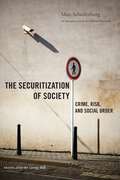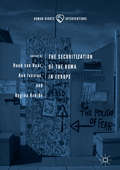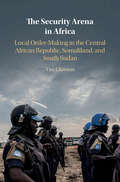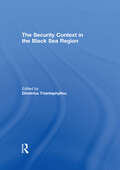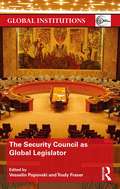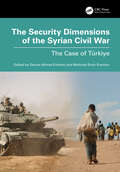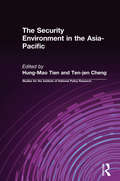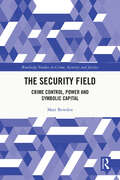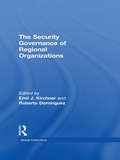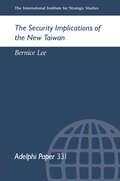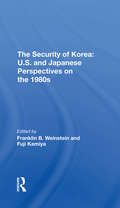- Table View
- List View
The Secular in South, East, and Southeast Asia (Global Diversities)
by Peter van der Veer Kenneth DeanThis innovative edited collection provides a comprehensive analysis of modern secularism across Asia which contests and expands prevailing accounts that have predominantly focused on the West. Its authors highlight that terms like ‘secular’, ‘secularization’, and ‘secularism’ do not carry the same meanings in the very different historical and cultural contexts of Asia. Critiquing Charles Taylor’s account of secularism, this book examines what travelled and what not in ‘the imperial encounter’ between Western secular modernity and other traditions outside of the West. Throughout the book, state responses to religion at different points in Chinese and South-East Asian history are carefully considered, providing a nuanced and in-depth understanding of post-secular strategies and relations in these areas. Particular attention is given to Catholicism in the Philippines, Vietnam, and Singapore, and Hinduism and Chinese religion in Malaysia, Singapore, and India. This theoretically engaged work will appeal to students and scholars of Asian studies, anthropology, religious studies, history, sociology, and political science.
The Securitisation of Climate Change and the Governmentalisation of Security (New Security Challenges)
by Franziskus von LuckeThis book provides an in-depth analysis of the securitisation of climate change in the US, Germany and Mexico and offers a rethinking of securitisation theory. Resting on a Foucauldian governmentality approach, it discusses how different climate security discourses have transformed the political handling of climate change and affected policies, practices and institutions. Going beyond the literature’s predominant focus on the global level, it gives a fine-grained examination of the political and institutional changes in different national contexts. Drawing on the governmentalisation of security, the book develops a new understanding of securitisation that focuses on the role of power. In doing so, it provides new insights into the transformative potential of linking climate change to security but also highlights the political and normative pitfalls of securitisation. ‘In this important book, Franziskus von Lucke provides a theoretically sophisticated and empirically rich account of the relationship between security and climate change. Developing a Foucauldian-inspired account of securitization, the book rejects blanket or universal claims about the climate change- security relationship, instead insisting on the need to critically examine how the securitization of climate change plays out in particular empirical contexts. Exploring the cases of the US, Germany and Mexico, von Lucke points to distinctive dynamics of securitization in these settings, with different implications for the practices these in turn encourage. Ultimately, this book constitutes an important addition to literature on the relationship between climate change and security, while developing a distinct and nuanced account of securitization that will be of interest to a wide range of scholars of security in international relations.’—Associate Professor Matt McDonald is a Reader in International Relations at the University of Queensland, Australia ‘In 2019 a number of states and other actors (notably the European Union) have made climate emergency declarations. It is therefore more important than ever to understand what the securitization of the climate means. That is: Who can securitize? What security measures are likely/ deemed legitimate by relevant audiences? How does securitization affect the population within and outside a securitizing state? And perhaps most importantly of all, will it succeed? Franziskus von Lucke’s carefully researched book offers answers to all of these questions and many others besides. von Lucke proceeds by examining with the US, Mexico and Germany, three real-life empirical cases of climate securitization. Each one provides unique insights that enable a fuller understanding of climate security. Accessibly written this is a must read for scholars and practitioners alike.’ —Dr Rita Floyd, University of Birmingham, UK, author of The Morality of Security: A theory of just Securitization, CUP, 2019 With great empirical detail and conceptual clarity, the book compares discourses and practices of climate security in different contexts. An essential reading for anyone interested in international climate politics, securitization theory, governmentality and the notion of power in International Relations. —Dr Delf Rothe, Institute for Peace Research and Security Policy Hamburg at the University of Hamburg, Germany
The Securitisation of Climate Change: Actors, Processes and Consequences (PRIO New Security Studies)
by Thomas Diez Franziskus von Lucke Zehra WellmannThis book provides the first systematic comparative analysis of climate security discourses. It analyses the securitisation of climate change in four different countries: USA, Germany, Turkey, and Mexico. The empirical analysis traces how specific climate-security discourses have become dominant, which actors have driven this process, what political consequences this has had and what role the broader context has played in enabling these specific securitisations. In doing so, the book outlines a new and systematic theoretical framework that distinguishes between different referent objects of securitisation (territorial, individual and planetary) and between a security and risk dimension. It thereby clarifies the ever-increasing literature on different forms of securitisation and the relationship between security, risk and politics. Whereas securitisation studies have traditionally focused on either a single country case study or a global overview, consequently failing to reconstruct detailed securitisation dynamics, this is the first book to provide a systematic comparative analysis of climate security discourses in four countries and thus closes an empirical gap in the present literature. In addition, this comparative framework allows the drawing of conclusions about the conditions for and consequences of successful securitisation based on empirical and comparative analysis rather than theoretical debate only. This book will of interest to students of climate change, environmental studies, critical security, global governance, and IR in general.
The Securitisation of Migration in the EU: Debates Since 9/11 (The European Union in International Affairs)
by Gabriella Lazaridis Khursheed WadiaThe Securitisation of Migration in the EU.
The Securitisation of Migration in the EU: Debates Since 9/11 (The European Union in International Affairs)
by Gabriella Lazaridis Khursheed WadiaSince 9/11 Western states have sought to integrate 'securitisation' measures within migration regimes as asylum seekers and other migrant categories come to be seen as agents of social instability or as potential terrorists. Treating migration as a security threat has therefore increased insecurity amongst migrant and ethnic minority populations.
The Securitisation of News in Turkey: Journalists as Terrorists? (The Palgrave Macmillan Series in International Political Communication)
by Natalie MartinThis book examines why Turkey has become infamous as a repressor of news media freedom. For the past decade or so it has stood alongside China as a notorious jailer of journalists – at the same time as being a candidate state of the EU. The author argues that the reasons for this conundrum are complex and whilst the AKP is responsible for the most recent illiberality, its actions should be taken in the wider context of Turkish politics – and the three way battle for power which has been raging between Kemalists, Kurds and Islamists since the republic was founded in 1923. The AKP are the current winners of this tripartite power struggle and the securitisation of journalists as terrorists is part of that quest. Moreover, whilst securitisation is not new, it has intensified recently as the number of the AKP’s political opponents has proliferated. Securitisation is also a means of delegitimising journalism – and neutralizing any threat to the AKP’s electoral prospects – whilst maintaining a democratic façade on the world stage. Lastly, the book argues that whilst the AKP’s securitisation of news began as a means of quashing the reporting of illiberality against wider political targets, since 2016 it has become a target in its own right. In the battle for power in Turkey, journalism is now one of the many losers.
The Securitization of Climate Change: Australian and United States' Military Responses (2003 - #2013)
by Michael Durant ThomasThis book examines the process of climate securitization within the United States and Australian political-military sector between 2003 - 2013. Drawing on established securitization frameworks ("Copenhagen" and "Paris" Schools), the author uses a combination of qualitative and quantitative techniques to systematically analyze more than 3,500 official publications from the US and Australian political-military sector. The results offers a rare insight into how each military framed climate change as a security threat and formulated their own unique institutional responses within a heavily politicized context. The book consists of eight chapters divided into four parts; focusing on: perspectives/methodological insights; empirical case studies; case study comparison and concluding observations.
The Securitization of Foreign Aid (Rethinking International Development series)
by Stephen Brown J�rn Gr�vingholtSecurity concerns increasingly influence foreign aid: how Western countries give aid, to whom and why. With contributions from experts in the field, this book examines the impact of security issues on six of the world's largest aid donors, as well as on key crosscutting issues such as gender equality and climate change.
The Securitization of Foreign Aid (Rethinking International Development)
by Stephen Brown Jörn GrävingholtSecurity concerns increasingly influence foreign aid: how Western countries give aid, to whom and why. With contributions from experts in the field, this book examines the impact of security issues on six of the world's largest aid donors, as well as on key crosscutting issues such as gender equality and climate change.
The Securitization of Humanitarian Migration: Digging moats and sinking boats (Routledge Advances in International Relations and Global Politics #Vol. 74)
by Scott D. WatsonThis book examines how western liberal states are progressively restricting access to refugees and asylum seekers, even though these states have signed international agreements obliging them to offer protection to those fleeing persecution and to advocate the spread of human rights and humanitarian principles. Watson examines how refugees and asylum seekers have come to be treated so poorly by these states through the use of policies such as visa requirements, mandatory detention and prevention/return policies. Providing extensive documentary analysis of debates on ‘restrictive’ refugee policies in Canada and Australia, the author addresses the relationship between security and migration, an issue of increased importance in the aftermath of 9/11 and the war on terror. He then examines hotly-contested policies such as detention and the forceful return of asylum seekers to demonstrate how attempts to securitise these issues have been resisted in the media and by political opposition. Given the importance of providing refuge for persecuted populations, not only to ensure the survival of targeted individuals, but also to maintain international peace and security, the erosion of protective measures is of great importance today. The book will be of interest to students and scholars of international security, international relations, migration and human rights
The Securitization of Memorial Space: Rhetoric and Public Memory
by Nicholas S. Paliewicz Marouf Hasian Jr.The Securitization of Memorial Space argues that the National September 11 Memorial and Memorial Museum is a securitized site of memory—what Foucault called a dispositif—that polices visitors and publics to remember trauma, darkness, and victimage in ways that perpetuate the “necessity” of the Global War on Terrorism. Contributing to studies in public memory, rhetoric and argumentation, and critical security studies, Nicholas S. Paliewicz and Marouf Hasian Jr. show how various human and nonhuman actors participated in complicated argumentative formations that have mobilized political, performative, and militaristic practices of anti-terroristic violence in other parts of the world. While there were times that certain argumentative stakeholders—such as local New Yorkers—questioned the necessity of securitizing this site of memory, agentic factions including the families of those who died on 9/11, public supporters, security agents, and politicians created an ideologically oriented security assemblage that remembers 9/11 through counter-terroristic performances at Ground Zero. In chronological order from the 2001 “dustbowl” to the present popularization of 9/11 memories, the authors present seven chapters of rich rhetorical analysis that show how the National September 11 Memorial and Memorial Museum perpetuates grief, uncertainty, and angst that affects public memory in multidirectional ways.
The Securitization of Migration: A Study of Movement and Order (Security and Governance)
by Philippe BourbeauThe international movement of people is provoking worldwide anxiety and apprehension. Nation-states around the globe, especially Western ones, are cracking down on migration for security reasons. International migration has become a key security issue and is perceived, by some, as an existential security threat. The Securitization of Migration is about the movement of people and the system of order underpinning the movement. In undertaking a comparative study of Canada and France, the study analyzes the process of securitizing migration. It explores the process of discursively and institutionally integrating international migration into security frameworks that emphasize policing and defence. Drawing upon social theory, migration studies, and Securitization Theory, Philippe Bourbeau seeks to understand the concepts of power underlying security frameworks and how these affect the treatment of migrants and immigrants. This book is one of the first to systematically and comparatively examine the role of political agents, media agents, and contextual factors in the process of securitizing migration. The book will be of interest to students and scholars concerned with comparative and theoretical approaches to security and migration studies.
The Securitization of Rape
by Sabine HirschauerThis book uniquely applies securitization theory to the mass sexual violence atrocities committed during the Bosnia war and the Rwandan genocide. Examining the inherent links between rape, war and global security, Hirschauer analyses the complexities of conflict related sexual violence.
The Securitization of Society: Crime, Risk, and Social Order (Alternative Criminology #12)
by Marc SchuilenburgTraditionally, security has been the realm of the state and its uniformed police. However, in the last two decades, many actors and agencies, including schools, clubs, housing corporations, hospitals, shopkeepers, insurers, energy suppliers and even private citizens, have enforced some form of security, effectively changing its delivery, and overall role. In The Securitization of Society, Marc Schuilenburg establishes a new critical perspective for examining the dynamic nature of security and its governance. Rooted in the works of the French philosophers Michel Foucault, Gilles Deleuze and Gabriel Tarde, this book explores the ongoing structural and cultural changes that have impacted security in Western society from the 19th century to the present. By analyzing the new hybrid of public-private security, this volume provides deep insight into the processes of securitization and modern risk management for the police and judicial authorities as well as other emerging parties. Schuilenburg draws upon four case studies of increased securitization in Europe – monitoring marijuana cultivation, urban intervention teams, road transport crime, and the collective shop ban – in order to raise important questions about citizenship, social order, and the law within this expanding new paradigm. An innovative, interdisciplinary approach to criminological theory that incorporates philosophy, sociology, and political science, The Securitization of Society reveals how security is understood and enacted in urban environments today.
The Securitization of the Roma in Europe (Human Rights Interventions Ser.)
by Huub Van Baar Ana Ivasiuc Regina KreideThis book discusses how Europe’s Roma minorities have often been perceived as a threat to majority cultures and societies. Frequently, the Roma have become the target of nationalism, extremism, and racism. At the same time, they have been approached in terms of human rights and become the focus of programs dedicated to inclusion, anti-discrimination, and combatting poverty. This book reflects on this situation from the viewpoint of how the Roma are often ‘securitized,’ understood and perceived as ‘security problems.’ The authors discuss practices of securitization and the ways in which they have been challenged, and they offer an original contribution to debates about security and human rights interventions at a time in which multiple crises both in and of Europe are going hand-in-hand with intensified xenophobia and security rhetoric.
The Security Archipelago: Human-Security States, Sexuality Politics, and the End of Neoliberalism
by Paul AmarIn The Security Archipelago, Paul Amar provides an alternative historical and theoretical framing of the refashioning of free-market states and the rise of humanitarian security regimes in the Global South by examining the pivotal, trendsetting cases of Brazil and Egypt. Addressing gaps in the study of neoliberalism and biopolitics, Amar describes how coercive security operations and cultural rescue campaigns confronting waves of resistance have appropriated progressive, antimarket discourses around morality, sexuality, and labor. The products of these struggles--including powerful new police practices, religious politics, sexuality identifications, and gender normativities--have traveled across an archipelago, a metaphorical island chain of what the global security industry calls "hot spots." Homing in on Cairo and Rio de Janeiro, Amar reveals the innovative resistances and unexpected alliances that have coalesced in new polities emerging from the Arab Spring and South America's Pink Tide. These have generated a shared modern governance model that he terms the "human-security state."
The Security Arena in Africa: Local Order-Making in the Central African Republic, Somaliland, and South Sudan
by Tim GlawionThe labels 'state fragility' and 'civil war' suggest that security within several African countries has broken down. As Tim Glawion observes, however, while people do experience insecurity in some parts of conflict-affected countries, in other areas they live in relative security. Conducting in-depth field-research between 2014 and 2018, The Security Arena in Africa is based on first-hand insights into South Sudan and the Central African Republic during their ongoing civil wars, and Somalia's breakaway state of Somaliland. Gaining valuable accounts from the people whose security is at stake, this bottom-up perspective on discussions of peace and security tells vivid stories from the field to explore complex security dynamics, making theoretical insights translatable to real-world experiences and revealing how security is created and undermined in these fragile states.
The Security Context in the Black Sea Region
by Dimitrios TriantaphyllouThis book on the security context in the Black Sea region is a timely endeavour and substantive contribution to understanding the state of play in the region and its linkages to the rest of the world. With contributions from analysts from Europe, the United States, Russia, Ukraine and Turkey, the book provides a holistic perspective. Post-Cold War developments have increased interest in the Black Sea region and the role of the regional and extra-regional actors in its security issues: this volume examines the position of the United States; NATO’s involvement; the EU’s engagement; Russia and Turkey’s aspirations alongside the policies of the other states in the region as they seek a role for themselves. It illustrates and investigates key concerns such as security, energy and energy security, regionalism and good governance; and questions why a cooperative security framework (or other regional schemes which could accommodate the needs of all stakeholders) has to date never become a reality.This book adds to the growing body of research on the region, presenting the facts of the current situation and asking what can be done in the Black Sea region for it to survive given its precarious security environment.This book was published as a special issue of Southeast European and Black Sea Studies.
The Security Council as Global Legislator (Global Institutions)
by Trudy Fraser Vesselin PopovskiSecurity Council resolutions have undergone an important evolution over the last two decades. While continuing its traditional role of determining state-specific threats to peace and engaging accordingly in various peaceful or coercive measures, the Security Council has also adopted resolutions that have effectively imposed legal obligations on all United Nations member states. This book seeks to move away from the discussions of whether the Security Council – in the current composition and working methods – is representative, capable or productive. Rather it assesses whether legislative activity by the Security Council can be beneficial to international peace and security. The authors examine and critique the capacities of the Security Council to address thematic international threats - such as terrorism, weapons proliferations, targeting of civilians, recruitment of child soldiers, piracy – as an alternative to the traditional model of addressing country-specific situations on a case-by-case basis. Ultimately, the book seeks to assess the efficacy of the Security Council as global legislator in terms of complementing the Security Council’s mandate for the maintenance of international peace and security with a preventative and norm-setting capacity. The book presents views from a diverse range of Security Council stakeholders including academic scholars, political analysts, and international lawyers. This resource will be of great interest to students of international relations, international organizations and international security studies alike.
The Security Dimensions of the Syrian Civil War: The Case of Türkiye (Security, Audit and Leadership Series)
by Mehmet Emin Erendor Serhat Ahmet ErkmenSyria's bloody civil war has plunged the cradle of the Levant into a painful spiral of violence. This spiral of violence has caused profound social, political, economic, and strategic changes in Syria. But the effects of the civil war are not limited to Syria. The civil war in Syria has become a direct problem not only for Syria but also for Türkiye, Iraq, Lebanon, and Jordan. However, most observers agree that of all Syria's neighbors, Türkiye has been the most affected by the civil war.When one thinks of Türkiye and Syria together in recent years, two concepts come to mind most often: Military operations and migration. However, conflicts in Syria have been perceived in a broader security paradigm in Türkiye.The main topics of the book can be summarized as follows: Border issues, sovereignty disputes, alliances, and military interventions in Türkiye–Syria relations. The effects of the civil war in Syria on Türkiye's foreign policy, economy, social structure, and internal security. Reflections of the civil war on Türkiye's relations with Iran, the US, and Russia. Increasing separatist and radical Salafist terrorism in Türkiye in line with the spillover effect of civil wars. Cross-border operations and Türkiye's military capacity. The problem of migration. Within the framework of the topics addressed, the book provides a comprehensive reading of the security problems caused by the Syrian Civil War on Türkiye. We believe that this book will shed light on why Türkiye perceives what is happening in Syria from a security perspective. In fact, the main idea of the book is simple: Syria has been a security issue for Türkiye since the 1930s, and it is still a security issue now. After approximately 100 years, the main idea has not changed. The only thing that has changed is how security is defined.
The Security Environment in the Asia-Pacific (Studies Of The Institute For National Policy Research #Vol. 1)
by Hung-Mao Tien Ten-jen ChengMultilateral security forums in the Asia Pacific region have evolved, but bilateral defence alliances continue to form the principle pillars of national security for most nations in the region. This text presents a survey of issues confronting the Asia-Pacific region as it enters year 2000.
The Security Field: Crime Control, Power and Symbolic Capital (Routledge Studies in Crime, Security and Justice)
by Matt BowdenHow crime and security are governed has become a critical issue in criminology over the first quarter of the twenty-first century. Today, we see a broader landscape of regulatory players who are involved in the control and management of crime, whether in crime prevention, safety in the community or in providing private security services. The Security Field: Crime Control, Power and Symbolic Capital gets to grips with these changes and argues that this forms an emerging field in which different players appear to compete and co-operate but are ultimately vying to shape and order the field. This book draws on new thinking in the social sciences on questions of crime, fear and security and contributes to the expanding interest on the sociology and criminology of security by offering a Bourdieusian approach to plural policing and the everyday political economy of security.Drawing from Bourdieu’s concept of field, this book builds a theory of the security field based upon a series of in-depth interviews with security actors such as senior police officers, NGOs, private security professionals, government officials and community safety workers in Ireland. It demonstrates how security producers compete for cultural capital in its many forms – as data, information and relationships – and ultimately as a way of cementing their positions in this emerging field. It shows the dominant power of the formal police and central government in shaping and ordering this relational space. In doing so, The Security Field: Crime Control, Power and Symbolic Capital builds an empirical case from three distinct areas of security production: urban security, community safety and the connections between regulated private security and public crime prevention. It explores the challenges of securitisation in respect of public safety, security and rights and the way in which social problems such as drug use, homelessness and urban marginality are recast as ‘security’ concerns.An accessible and compelling read, this book will appeal to students and scholars of criminology, sociology, urban studies and security studies.
The Security Governance of Regional Organizations (Global Institutions)
by Emil J. Kirchner Roberto DomínguezThe Security Governance of Regional Organizations assesses the effectiveness of regional organizations as regional or global security providers, and examines how policy preferences, resources, capabilities, institutional mechanisms and economic and political cohesion link with collective action behaviour in four security policy functions. It investigates how regional organizations meet the new security threats or respond to strategic geopolitical changes and what adaptations they make in the process. Divided into three parts and using a common analytical framework, the book explains the changing security agenda in ten key regional organizations, each organizational chapter: identifies the nature of threats within the region examines the historical development and the degree of institutionalization assesses the level of governance explores the context of interaction investigates the compliance with the norms of the system of governance. This collection contributes to the ongoing reconceptualization of security and definition of security governance, and explores whether regional security governance processes are unique or similar and whether some organizational experiences can be seen as models for others to follow. It combines a coherent theoretical framework with strong comparative case studies, making it ideal reading for all students of security studies.
The Security Implications of the New Taiwan (Adelphi series #No. 331)
by Bernice LeeHow can fresh conflict between China and Taiwan be avoided? This paper argues that unless the key players - Taiwan, China and the US - accept the existence of a new and increasingly democratic Taiwan, the conflict across the Taiwan Straits will remain one of the most contentious and dangerous in East Asia.
The Security Of Korea: U.s. And Japanese Perspectives On The 1980s
by Franklin B. Weinstein Fuji KamiyaAny discussion of the security of Korea has implications for U.S.-Japan relations, but the Carter administration's announcement in 1977 of its intention to withdraw U.S. ground-combat forces from Korea by 1982, which brought to the surface deep-rooted Japanese and American frustrations with one another, made it clear that neither side fully understood the other's view of Korea. This book, a collaborative effort by specialists of diverse expertise and viewpoints, clarifies U.S. and Japanese perceptions of the Korean problem and explores alternative approaches to the maintenance of peace and security on the Korean peninsula. Demonstrating that much of the conventional wisdom about Korean security rests on oversimplifications, exaggerated fears, and mistaken assumptions, the authors assert that the prospects for avoiding conflict grow brighter despite existing pitfalls, and offer recommendations for the U.S. and Japanese governments.
